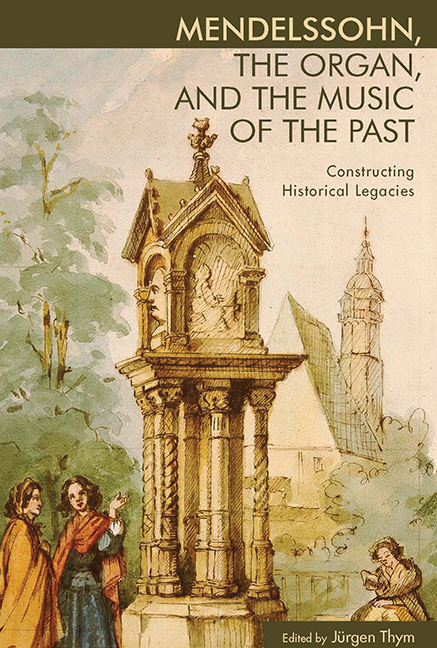Book contents
- Frontmatter
- Dedication
- Contents
- Acknowledgments
- Introduction: Of Statues and Monuments
- Part One Composition and Tradition
- Part Two Mendelssohn and the Organ
- Part Three Mendelssohn's Inherited Legacies in Context
- 8 The Bach Tradition among the Mendelssohn Ancestry
- 9 Music History as Sermon: Style, Form, and Narrative in Mendelssohn's “Dürer” Cantata (1828)
- 10 Mendelssohn's “Authentic” Handel in Context: German Approaches to Translation and Art and Architectural Restoration in the Early Nineteenth Century
- 11 Beyond the Ethical and Aesthetic: Reconciling Religious Art with Secular Art-Religion in Mendelssohn's “Lobgesang”
- 12 Mendelssohn's Religious Worlds: Currents and Crosscurrents of Protestantism in Nineteenth-Century Germany and Great Britain
- List of Contributors
- Index
10 - Mendelssohn's “Authentic” Handel in Context: German Approaches to Translation and Art and Architectural Restoration in the Early Nineteenth Century
from Part Three - Mendelssohn's Inherited Legacies in Context
Published online by Cambridge University Press: 14 March 2018
- Frontmatter
- Dedication
- Contents
- Acknowledgments
- Introduction: Of Statues and Monuments
- Part One Composition and Tradition
- Part Two Mendelssohn and the Organ
- Part Three Mendelssohn's Inherited Legacies in Context
- 8 The Bach Tradition among the Mendelssohn Ancestry
- 9 Music History as Sermon: Style, Form, and Narrative in Mendelssohn's “Dürer” Cantata (1828)
- 10 Mendelssohn's “Authentic” Handel in Context: German Approaches to Translation and Art and Architectural Restoration in the Early Nineteenth Century
- 11 Beyond the Ethical and Aesthetic: Reconciling Religious Art with Secular Art-Religion in Mendelssohn's “Lobgesang”
- 12 Mendelssohn's Religious Worlds: Currents and Crosscurrents of Protestantism in Nineteenth-Century Germany and Great Britain
- List of Contributors
- Index
Summary
Either the translator leaves the author at peace as much as possible and moves the reader toward the author, or he leaves the reader at peace as much as possible and moves the author toward the reader.
—Friedrich Schleiermacher, “Über die verschiedenen Methoden des Übersetzens” (On the different methods of translating) 1813/1838Felix Mendelssohn's efforts to reform the performance style of early music (notably Handel oratorios) have received only some of the attention they rightfully claim: in 1969 Susanna Grossmann-Vendrey touched on the subject in her book on Mendelssohn and historical music; in the 1990s I published a short essay on his Handel performances at the Lower Rhine music festivals against the backdrop of eighteenth-century performance traditions (Mozart's arrangements of Handel) and their discussion in the musical press; and in 2008 Ralf Wehner presented the most detailed discussion of Mendelssohn's Handel performances to date. In this study I will broaden the focus by placing Mendelssohn's work as well as the contemporary debate on arrangements of historical music—Handel was the focus—in their cultural-historical context and by examining comparable developments in architecture, the visual arts, and literature.
Our appreciation of the singularity, in his time and for many decades thereafter, of Mendelssohn's vision of a historically correct performance style should not obscure the fact that his reforms, and the aesthetic and cultural-historical perspective that informed them, comprised just one current in a broad stream of cultural historicism that stimulated efforts in Germany and in other, primarily northern European, countries to preserve art and literature of the past and to make it available and understandable to a modern public. The alternatives for translators that Friedrich Schleiermacher proposed in the passage cited above establish, perhaps over-reductively, the antipodes framing the field of divergent perspectives and practices about unfamiliar music, literature, and the visual arts. Because they can be applied, in their general form, not only to literature, but rather to all these areas, they also provide something of a unifying conceptual field for my topic, which lends some measure of methodological integrity to the difficult task of discussing very different artistic media. However different their materials and forms were, artists and theorists in all these areas were faced with the same problem: how to preserve and present old and unfamiliar, even foreign artifacts to the contemporary recipient.
- Type
- Chapter
- Information
- Mendelssohn, the Organ, and the Music of the PastConstructing Historical Legacies, pp. 264 - 286Publisher: Boydell & BrewerPrint publication year: 2014



